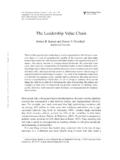Transcription of The Importance of Flexible Leadership - Kaplan DeVries
1 In Robert B. Kaiser (Chair), THE Importance , ASSESSMENT, AND DEVELOPMENT OF Flexible Leadership , practitioner forum presented at the 23rd annual conference of the Society for Industrial-Organizational Psychology, April, 2008. San Francisco, CA. The Importance of Flexible Leadership Gary Yukl UAlbany Research on Leadership and management during the past several decades provide strong evidence that Flexible , adaptive Leadership is essential for most managers. The evidence comes from several different types of research and many different theories. Flexible , adaptive Leadership is especially important when there is substantial change in situation and the Leadership behaviors that are relevant for it.
2 Differences in the situation occur within the same position, when a person is transitioning to a different Leadership position, or when major changes are made in the current position ( , reorganization, merger). This paper provides a brief review of the relevant literature in management and Leadership . The relevant literature from the past half century is vast, and my review only provides representative examples of different types of research. Comparing Different Types of Managers Many comparative studies have been conducted to identify roles , activities, skills, and behaviors associated with different types of management and administrative positions.
3 The comparative studies find both similarities and differences in the essential activities and relevant behaviors for different types of positions. Research on managers at different levels found that the relevant roles and behaviors vary from first-line supervisors to top executives ( , Jacobs & Jaques, 1987; McCall, Morrison & Hannan, 1978; McCall & Segrist, 1980; Mumford, Campion, & Morgeson, 2007). Research comparing different types of management positions ( , staff vs. line position, sales vs. production) also finds important differences in the required skills and behaviors. The cross-cultural research on Leadership provides additional evidence of the need for flexibility in behavior when taking a management position in a different country ( , House et al.)
4 , 2004). Despite the demands and constraints for a position, managers have choices and they can influence the scope of their responsibilities and the time they devote to different activities ( , Stewart, 1982). However, managers who spend a long time in one type of position usually have more difficulty in adapting to the requirements of a different type of position. The research comparing managers with either successful or derailed careers found that the behaviors and skills that are strengths in one type of position can become weaknesses if a manager is not Flexible enough to adapt to the new requirements for a different position ( , Lombardo & McCauley, 1988; McCall & Lombardo, 1983).
5 The research comparing managerial positions has implications for improving Flexible , adaptive Leadership . First, managers should proactively seek to reduce constraints, modify demands (role expectations), and expand their choices over time. Second, a person's ability to adapt to different requirements should be considered in making selection and promotion decisions. Third, a variety of different types of challenges and Leadership positions early in one's career can help individuals become more Flexible and adaptive. The research at CCL identified types of challenges that are relevant for developing different Leadership skills ( , McCauley, Eastman, & Ohlott, 1995).
6 2 Different Situations For the Same Manager Another set of studies has examined how managers must adapt to different situations within the same job. Vroom and Yetton (1973) proposed a normative model specifying which decision procedures are appropriate for different types of decisions, and the research found that managers whose decision procedures were consistent with the normative model were more likely to be effective. Situational theories of Leadership such as path-goal theory ( , House & Mitchell, 1974) and the Multiple-linkage Model (Yukl, 1989) identify appropriate behaviors for managers who are responsible for different types of tasks.
7 For example, more clarifying of role expectations is needed for tasks that are novel and complex than for tasks that are routine and simple. Likewise, more supportive Leadership is needed when the task is very stressful and difficult. Other theories of Leadership specify different behaviors for subordinates who differ in their skills and motivation (Hersey & Blanchard, 1984) or their exchange relationship ( , Graen, 1985). For example, more delegation is appropriate and less close monitoring is needed for a subordinate who is confident and competent than for one who is not. Finally, research on influence tactics finds that a different mix of tactics is appropriate depending in whether the target person is a subordinate, peer, or boss (Kipnis, Schmidt & Wilkinson, 1980; Yukl, 2006; Yukl & Falbe, 1990).
8 The research on situational differences for the same manager has several implications for improving Flexible , adaptive Leadership . First, managers need to learn how to diagnose the situation quickly and understand what pattern of behavior that will produce a successful outcome. Second, managers should become proficient at using a wide range of behaviors. Third, managers can be proactive about influencing the situational variables that determine what behavior choices are available or necessary. Changing Conditions and New Information Flexible , adaptive Leadership is also important when unusual events and external changes create an immediate crisis or an emerging threat or opportunity.
9 Abrupt changes in the preferences or priorities of bosses, clients, or other users provide one source of uncertainty, and they may require quick revisions in plans and schedules. Adaptive behavior is also important when there are unusual events such as accidents, equipment breakdowns, supply shortages, a terrorist attack, or the effects of bad weather. Crisis management requires unusual actions and behaviors from leaders, and failure to respond in a decisive, appropriate way is often very visible. External changes that will affect the organization may be gradual rather than abrupt, but major changes may be needed to respond to new threats or opportunities.
10 Even when there is more time for planning an appropriate strategy, Flexible adaptive Leadership is important to ensure the organization will survive and prosper in the future. Finally, when managers receive feedback about the effects of prior actions and decisions, there is an opportunity to evaluate effectiveness and determine if additional actions are required. A Flexible , adaptive response is especially important when there is information that a prior decision or strategy is not working as expected and is likely to fail if adjustments are not made in a timely way. The research on crises and major external changes provide some additional insights about Flexible , adaptive behavior.



